- Home
- Vicki Delany
A Curious Incident Page 4
A Curious Incident Read online
Page 4
“I wasn’t part of the selection subcommittee; my role was selling tickets and helping with promotion. Yesterday morning, I was touring the first house when I got a call to tell me what had happened at Sheila’s. I went there immediately to survey the damage and try to calm the woman down. I have to say, it was far worse than I’d been told. Perfectly shocking! Sheila was not inclined to be calmed.”
“Did she say who she thought had done it?”
“Oh yes. She told everyone it was Anna and vowed to get her revenge. I’d only just arrived when she ran out of the garden, jumped in her car, and headed for Anna’s. She looked, I must say, like a mad thing. Absolutely everyone is talking about what happened when she got to Anna’s house.”
“What precisely did happen?”
“Anna was in her garden, chatting to the tour groups, when Sheila arrived. She flew at Anna, yelling and screaming and throwing around accusations. I believe she even accused Anna of sleeping with her husband. Rather than simply turn and go into the house, as she should have, Anna foolishly responded in kind and hurled insults at Sheila. Accounts differ as to who threw the first punch, but onlookers had to physically separate them. It was like something out of a movie, one of my friends said. Someone threated to call the police if Sheila didn’t leave, and several people forcibly walked Sheila to her car. She left, throwing threats behind her all the way. Anna was, needless to say, distraught and had a few choice words to say about Sheila after she’d left. The garden club doyennes had a heck of a time trying to get the tour back on track.”
“Do you think Anna did it? Sabotaged Sheila’s garden, I mean?”
Mrs. Ramsbatten leaned back in her chair and thought. “I can’t say. I didn’t know her well enough. She denied it, of course. Anna is—I should say she was—a member of our club, but she rarely if ever came to the meetings or the social activities. Not if she wasn’t the featured speaker, at any rate.”
“You said Sheila accused Anna of having an affair with her husband. Is that true?”
“That, my dear Gemma, I wouldn’t know anything about. If they were carrying on, they didn’t do it in full view of the West London Garden Club. Now, how about that cup of tea? I do an excellent G&T, if you’d prefer that.”
Chapter Five
My phone rang as I was leaving Mrs. Ramsbatten’s house, well-fortified with not one but two gin and tonics. She did, I thought as I staggered down the sidewalk, have a heavy hand on the gin bottle.
As we sipped our drinks, Mrs. Ramsbatten told me about her life. She’d earned several degrees in mathematics, and early in her career she’d worked alongside Admiral Grace Hopper in the development of COBOL, one of the earliest computer languages. She’d later gone to work at IBM where she met Mr. Ramsbatten, and together they’d been part of the development team coordinating with Microsoft on MS-DOC, the operating system for the first IBM PC.
“I suspect,” I said as I accepted the second drink, “you know what a blog is.”
She winked at me. “I try to keep up, yes. But I’ve done my bit, and I’m content to work on my garden and let the world of technology carry on without me. As it has had to do without Mr. Ramsbatten.” Her voice had turned wistful and she’d stared into space. “He truly was a genius.”
I shook off the effect of the G&Ts and answered the ringing of my phone. “Hello?”
“Hey, Gemma. I’ve been talking to my mom …”
“Good evening, Jayne.”
“Yeah, good evening. I’ve been talking to my mom. She’s a member of the West London Garden Club.”
“Your mother’s a member of everything. If she moves, half the cultural institutions of West London will fall”—I hiccupped—“into chaos.”
“Your voice sounds strange. Have you been drinking?”
“I had a small tipple with my next-door neighbor.” Home again, I put my key in the lock, twisted it, and the door opened. I was quite proud of myself for getting it on the first try. Violet ran in excited circles around my legs.
“Mom knew Anna Wentworth moderately well,” Jayne said.
“Did she now?”
“I told Mom you’re investigating her death—”
“I’m not investigating.”
“Whatever. And she said to tell you the garden club has called an emergency meeting for tomorrow evening. You’re welcome to come as her guest.”
“I might just do that, but right now I want to have a look at the scene of the crime. Scenes of the crimes, I should say. It’s eight thirty, so I have some daylight left if I go now.”
“Go where?”
“The place where Anna was found. I’m sure the police have it cordoned off, but I can try to get a peek. And then Sheila Tierney’s garden.”
“Good thing you’re not investigating,” Jayne said. “You’re not driving anywhere, I hope.”
“Not necessary. I can walk.”
“Do you want me to come with you?”
“Yes.”
“Be there in ten.”
* * *
True to her word, Jayne pulled up eight minutes later, giving me enough time to feed Violet and freshen myself up. By which I mean brush my teeth and gargle with mouthwash. If I was going to have a chat with the police, I didn’t want anyone thinking I’d been drinking.
Not that I’d been drinking. It was only two G&Ts with a friendly neighbor.
I studied myself in the mirror and hiccupped. I splashed more water on my face. Come to think of it, I’d had my back turned and had been studying a particularly fine painting on her wall as Mrs. Ramsbatten prepared my second drink, and I might have heard her say, “Oops” as the gin splashed into my glass.
Jayne’s car pulled into the driveway, and Violet and I let ourselves out of the house. Jayne and Violet exchanged greetings, and we all set off as the streetlights flickered to life.
The sun had dipped below the horizon, wrapping everything in deep purple dusk, but at this hour in late June, it would be light enough for a while yet not to need artificial light.
The spot where Anna Wentworth had died was not far from my house. A quiet residential street near a large and grassy town park with a nice children’s play area, a scattering of picnic tables and benches, and a thicket of large old oaks and maples. I often came here to let Violet romp off leash.
We saw the red and blue lights as soon as we turned the corner. The park was cordoned off with yellow police tape, and a cruiser and a white panel van blocked the road in front of the treed section. Officer Stella Johnson stood on the sidewalk, presumably to keep the curious away.
I assumed she’d count me among the curious.
Almost twenty-two hours had passed since Anna’s body had been found. Most of the initial forensic work would have been done long ago and all the potential clues removed, leaving me precious little to work with.
Not that the police were likely to let me work with anything at all.
“Engage Stella in conversation,” I whispered to Jayne as we crossed the road. I slipped the leash into Jayne’s hand.
“Why don’t you?” she whispered back.
“Because my conversational skills are limited, and I prefer to divert my attention elsewhere.”
“Hi, Stella,” Jayne called. “You have a nice night to stand out here. How’s it going?”
“Boring,” she said. “What are you two doing here?”
Violet sniffed at Stella’s uniform pants. She bent over and gave the dog a hearty pat. Violet wagged her tail.
“Just taking the dog for a walk,” Jayne said.
I edged away from them and stepped ever so casually off the sidewalk into the park. The line of trees came close to the road, and underneath the heavy, leaf-filled branches and between the solid trunks, darkness came early. A thin beam of light flashed from inside the copse, and a woman said something I didn’t quite catch.
I checked the position of the streetlights. This particular spot was exactly halfway between two on this side of the road. The light on the other side was burned out. It would be very dark when the daylight completely faded, and darker still among the trees.
“Do you like being a police officer?” Jayne asked Stella Johnson.
“Not when I have to stand around for hours chasing away nosy citizens,” she replied. “Gemma, what are you doing?”
“Do you have a dog?” Jayne asked. “Violet senses something on your pants.”
“Yes,” she said, “we do. Gemma, you can’t go there.”
I pretended not to hear her and lifted my leg to swing it over the crime-scene tape.
I put it down again very swiftly when a dark figure stepped out of the night, a bright light shone in my face, and a familiar voice said, “Not you again.”
“Good evening, Detective,” I said.
“Enjoying a pleasant chat, Officer Johnson?” Detective Louise Estrada asked.
“Uh …” Stella Johnson said.
“Never mind. I know what it’s like to try to get Gemma not to do something she wants to do.” Estrada looked at me. “Take one step closer and I’ll arrest you for interfering with a crime scene.”
I knew better than to think she was joking. “I assumed you’d be here, Detective, and I thought you might appreciate some help.”
“Oh, for heaven’s sake. I do not want or need help from any passerby. But if I did, rest assured you’d be the last person I’d call.”
I decided to ignore that comment. “Have you found the murder weapon?”
More voices and two people dressed in white coveralls emerged from the copse. “That’s it for now, Detective,” one of them said. “We’ve got everything we need. Oh, what a nice dog. Can I pat him?”
“Sure,” I said.
“No,” Estrada said. “This person has been ordered to leave.”
Jayne straightened her shoulders. “I don’t think you can order us to leave the public sidewalk.”
Estrada crossed her arms over her chest. She was tall and lean, olive-skinned and dark-haired, dressed in a brown leather jacket, black trousers, and ankle boots. She managed to look formidable even when she wasn’t trying. Right now, she was trying. “I don’t think it would be a good idea for you to attempt to imitate your friend here, Jayne.”
Jayne deflated. “Sorry.”
The forensic officers opened the back door of their van and began stripping off their white coveralls. Like magic, as though they’d heard a secret signal, people began gathering on the sidewalk or standing on their front porches to watch.
“Good night, Gemma.” Notably, Detective Estrada had not answered my question.
“Good night,” I said.
“’Night,” Jayne said.
Violet paused to sniff at Estrada’s legs. Estrada looked down at her and let out a short, sharp growl. Violet yipped and hurried to catch up to me. I took out my phone, pressed a few buttons, and put it back in my pocket.
“Learn anything?” Jayne asked when we were out of earshot.
“I doubt it would have mattered if I’d been able to get into the park, but I’ll come back after they’ve gone. The police have had more than enough time to trample over everything with their big feet and pick up anything they suspect might be a clue.”
“This isn’t a Sherlock Holmes story, Gemma. The police today don’t mindlessly trample all over clues.”
“I am, of course, speaking theoretically. They don’t always realize what’s significant. However, in this case, I suspect anything to be found would have been apparent. Imagine the scene: a woman with her dog; a person stepping out of the darkness; a blow to the head. Any evidence left by the killer would be obvious—a cigarette butt, a dropped driver’s license. The spot was carefully chosen.”
“In what way?”
“It’s darker at that precise location than any place else on that street, darker in fact than almost any place else in this neighborhood. I need to find out if that was Anna’s regular dog-walking route and her regular time. Quite possibly it was, which means her attacker could have known she’d be passing and planned accordingly.”
“Any chance this was a random attack on a woman alone at night with only her dog? As much as I hate thinking about something like that happening in West London.”
“Highly unlikely. Particularly not after the incident earlier.”
“You mean the vandalism to Sheila Tierney’s garden? You think Sheila killed Anna in revenge for destroying her garden?”
“I haven’t dismissed that possibility, but it’s entirely plausible someone else took advantage of the day’s drama to do what they intended to do anyway.”
Jayne shivered. “I feel very cold all of a sudden.”
“Murder is a cold-blooded business.”
“Why are we walking so quickly? I’ve already been to the gym today, thanks. I went after work.”
“I’m conducting an experiment. It might have been more effective without the dog,” I said as Violet veered off the path in pursuit of something only she could detect. I tugged at the leash to get her back on track, and she came, although reluctantly.
We turned several corners, and soon the Tierney house came in sight. Every light, inside and outside the house, was on. I took out my phone and stopped the timer app. “Four and a half minutes. It’s taken us four and a half minutes to walk here from the scene of Anna’s death. Say four minutes if we didn’t have Violet.”
“Still less if we’d run.”
“Yes, but a running woman attracts attention.” This was an affluent neighborhood of comfortable family homes, close to the ocean and to town. A neighborhood where people walked, particularly in the warm evenings when daylight lingered for hours. Exercising their dogs, taking their kids to the park before bed or heading home from a soccer game, going for an evening stroll, returning from dinner at the pier or a movie in town.
Anna Wentworth had died at approximately quarter past ten. Not long after full dark. Late for people with kids to be out, but still early enough that a person out for a walk wouldn’t be commented on or remembered.
“This time,” I said to Jayne, “leave the talking to me.”
“Thank heavens for that. I have absolutely no idea what to say to a murder suspect, other than ‘did you do it?’”
The front garden of the Tierney home had not been vandalized, and no sign of the damage done was apparent from the street. The SUV was in the driveway and the garage doors were closed. I pressed the bell and heard it pealing inside the house. The front door was inset with a pane of frosted glass, and I could see into the lit foyer. The shape of a man’s head popped around the corner. I smiled and waved. He blinked, appeared to recognize me, and then the door creaked open.
“You’re the woman from the bookstore, right?” he said. “You helped Lauren with her cat. Sorry, I’ve had reporters poking around all day. Come in—quickly, before a photographer tries to take a picture and imply you’re my mysterious lover.”
Jayne, Violet, and I stepped into the house, and the door shut behind us.
David Tierney was a moderately attractive man in his forties, and he didn’t seem partially snooty to me, as Irene had said. Deep purple shadows lay under his eyes, he’d missed several spots when shaving and had also nicked his chin, and a coffee stain marked the front of his T-shirt. As he was supposedly a businessman, I assumed he didn’t regularly go around ill-groomed. The stress of the past two days was apparently getting to him.
“I’m sorry for your troubles,” I said.
“Yeah.” He rubbed the patch of stubble on his chin. “Thanks. First, I have to thank you for helping Lauren and finding Snowball. You were a lifesaver.”
“My pleasure,” I said.
“What can I do for you? I’m afraid this isn’t a good time for a visit.”
“I understand. Are you aware Lauren came to see me this afternoon?”
He shook his head. “No, I wasn’t. I thought she was visiting a friend. Why did she do that?”
I lowered my voice. “Is your wife at home?”
“Yes, but Sheila’s not receiving visitors. She’s upstairs, locked in the bedroom, not talking to me, and refusing to see anyone. Even Lauren. This has all been very … upsetting to her.”
Upsetting to Lauren as well, I thought. At eleven years old, the girl would need her parents to help her deal with all that was happening.
I’d met Sheila Tierney exactly once, but that had been enough time for me to suspect she didn’t place her daughter’s needs high on her list of priorities.
Lauren slipped quietly into the foyer, Snowball nestled in her arms. The girl’s eyes were huge dark pools in her lightly tanned face. She nuzzled herself against her father, and he rested his hand on her shoulder. Violet barked at the sight of the cat, and Snowball hissed in return.
“One day,” I said, “we’ll introduce these two properly and they can be friends. But perhaps not right now.”
“Have you found out who killed Mrs. Wentworth?” Lauren asked.
“Lauren!” David said. “That’s hardly Ms. Doyle’s responsibility.”
“It’s okay. Lauren asked for my help.” I fixed my eyes on hers. “The West London police are very good at their jobs, Lauren. You have to believe that. They won’t charge your mother if she didn’t do it.”
“I wouldn’t be so—” David started to say.
“Not now,” I interrupted. “You asked for my help, Lauren, but I have to tell you that real life isn’t like TV. It’s highly unlikely an amateur can solve a case the police cannot.”
“Aunt Irene said you do it all the time.”
“Not exactly all the time.”
“You found Snowball.” The way the girl looked at me broke my heart. She really believed in me.
Jayne must have thought the same. “Gemma isn’t saying she won’t do what she can, Lauren, but she’s trying to be realistic.”
“I don’t understand,” David said. “What has any of this got to do with the cat?”
“Nothing, really,” I said. “I’d like to speak to Sheila if she’s willing to talk to me about what happened.”
“I suppose I can ask her,” David said slowly. “Don’t know that she’ll want to, though. She can be … um … stubborn sometimes.”
“Did she say who she thought had done it?”
“Oh yes. She told everyone it was Anna and vowed to get her revenge. I’d only just arrived when she ran out of the garden, jumped in her car, and headed for Anna’s. She looked, I must say, like a mad thing. Absolutely everyone is talking about what happened when she got to Anna’s house.”
“What precisely did happen?”
“Anna was in her garden, chatting to the tour groups, when Sheila arrived. She flew at Anna, yelling and screaming and throwing around accusations. I believe she even accused Anna of sleeping with her husband. Rather than simply turn and go into the house, as she should have, Anna foolishly responded in kind and hurled insults at Sheila. Accounts differ as to who threw the first punch, but onlookers had to physically separate them. It was like something out of a movie, one of my friends said. Someone threated to call the police if Sheila didn’t leave, and several people forcibly walked Sheila to her car. She left, throwing threats behind her all the way. Anna was, needless to say, distraught and had a few choice words to say about Sheila after she’d left. The garden club doyennes had a heck of a time trying to get the tour back on track.”
“Do you think Anna did it? Sabotaged Sheila’s garden, I mean?”
Mrs. Ramsbatten leaned back in her chair and thought. “I can’t say. I didn’t know her well enough. She denied it, of course. Anna is—I should say she was—a member of our club, but she rarely if ever came to the meetings or the social activities. Not if she wasn’t the featured speaker, at any rate.”
“You said Sheila accused Anna of having an affair with her husband. Is that true?”
“That, my dear Gemma, I wouldn’t know anything about. If they were carrying on, they didn’t do it in full view of the West London Garden Club. Now, how about that cup of tea? I do an excellent G&T, if you’d prefer that.”
Chapter Five
My phone rang as I was leaving Mrs. Ramsbatten’s house, well-fortified with not one but two gin and tonics. She did, I thought as I staggered down the sidewalk, have a heavy hand on the gin bottle.
As we sipped our drinks, Mrs. Ramsbatten told me about her life. She’d earned several degrees in mathematics, and early in her career she’d worked alongside Admiral Grace Hopper in the development of COBOL, one of the earliest computer languages. She’d later gone to work at IBM where she met Mr. Ramsbatten, and together they’d been part of the development team coordinating with Microsoft on MS-DOC, the operating system for the first IBM PC.
“I suspect,” I said as I accepted the second drink, “you know what a blog is.”
She winked at me. “I try to keep up, yes. But I’ve done my bit, and I’m content to work on my garden and let the world of technology carry on without me. As it has had to do without Mr. Ramsbatten.” Her voice had turned wistful and she’d stared into space. “He truly was a genius.”
I shook off the effect of the G&Ts and answered the ringing of my phone. “Hello?”
“Hey, Gemma. I’ve been talking to my mom …”
“Good evening, Jayne.”
“Yeah, good evening. I’ve been talking to my mom. She’s a member of the West London Garden Club.”
“Your mother’s a member of everything. If she moves, half the cultural institutions of West London will fall”—I hiccupped—“into chaos.”
“Your voice sounds strange. Have you been drinking?”
“I had a small tipple with my next-door neighbor.” Home again, I put my key in the lock, twisted it, and the door opened. I was quite proud of myself for getting it on the first try. Violet ran in excited circles around my legs.
“Mom knew Anna Wentworth moderately well,” Jayne said.
“Did she now?”
“I told Mom you’re investigating her death—”
“I’m not investigating.”
“Whatever. And she said to tell you the garden club has called an emergency meeting for tomorrow evening. You’re welcome to come as her guest.”
“I might just do that, but right now I want to have a look at the scene of the crime. Scenes of the crimes, I should say. It’s eight thirty, so I have some daylight left if I go now.”
“Go where?”
“The place where Anna was found. I’m sure the police have it cordoned off, but I can try to get a peek. And then Sheila Tierney’s garden.”
“Good thing you’re not investigating,” Jayne said. “You’re not driving anywhere, I hope.”
“Not necessary. I can walk.”
“Do you want me to come with you?”
“Yes.”
“Be there in ten.”
* * *
True to her word, Jayne pulled up eight minutes later, giving me enough time to feed Violet and freshen myself up. By which I mean brush my teeth and gargle with mouthwash. If I was going to have a chat with the police, I didn’t want anyone thinking I’d been drinking.
Not that I’d been drinking. It was only two G&Ts with a friendly neighbor.
I studied myself in the mirror and hiccupped. I splashed more water on my face. Come to think of it, I’d had my back turned and had been studying a particularly fine painting on her wall as Mrs. Ramsbatten prepared my second drink, and I might have heard her say, “Oops” as the gin splashed into my glass.
Jayne’s car pulled into the driveway, and Violet and I let ourselves out of the house. Jayne and Violet exchanged greetings, and we all set off as the streetlights flickered to life.
The sun had dipped below the horizon, wrapping everything in deep purple dusk, but at this hour in late June, it would be light enough for a while yet not to need artificial light.
The spot where Anna Wentworth had died was not far from my house. A quiet residential street near a large and grassy town park with a nice children’s play area, a scattering of picnic tables and benches, and a thicket of large old oaks and maples. I often came here to let Violet romp off leash.
We saw the red and blue lights as soon as we turned the corner. The park was cordoned off with yellow police tape, and a cruiser and a white panel van blocked the road in front of the treed section. Officer Stella Johnson stood on the sidewalk, presumably to keep the curious away.
I assumed she’d count me among the curious.
Almost twenty-two hours had passed since Anna’s body had been found. Most of the initial forensic work would have been done long ago and all the potential clues removed, leaving me precious little to work with.
Not that the police were likely to let me work with anything at all.
“Engage Stella in conversation,” I whispered to Jayne as we crossed the road. I slipped the leash into Jayne’s hand.
“Why don’t you?” she whispered back.
“Because my conversational skills are limited, and I prefer to divert my attention elsewhere.”
“Hi, Stella,” Jayne called. “You have a nice night to stand out here. How’s it going?”
“Boring,” she said. “What are you two doing here?”
Violet sniffed at Stella’s uniform pants. She bent over and gave the dog a hearty pat. Violet wagged her tail.
“Just taking the dog for a walk,” Jayne said.
I edged away from them and stepped ever so casually off the sidewalk into the park. The line of trees came close to the road, and underneath the heavy, leaf-filled branches and between the solid trunks, darkness came early. A thin beam of light flashed from inside the copse, and a woman said something I didn’t quite catch.
I checked the position of the streetlights. This particular spot was exactly halfway between two on this side of the road. The light on the other side was burned out. It would be very dark when the daylight completely faded, and darker still among the trees.
“Do you like being a police officer?” Jayne asked Stella Johnson.
“Not when I have to stand around for hours chasing away nosy citizens,” she replied. “Gemma, what are you doing?”
“Do you have a dog?” Jayne asked. “Violet senses something on your pants.”
“Yes,” she said, “we do. Gemma, you can’t go there.”
I pretended not to hear her and lifted my leg to swing it over the crime-scene tape.
I put it down again very swiftly when a dark figure stepped out of the night, a bright light shone in my face, and a familiar voice said, “Not you again.”
“Good evening, Detective,” I said.
“Enjoying a pleasant chat, Officer Johnson?” Detective Louise Estrada asked.
“Uh …” Stella Johnson said.
“Never mind. I know what it’s like to try to get Gemma not to do something she wants to do.” Estrada looked at me. “Take one step closer and I’ll arrest you for interfering with a crime scene.”
I knew better than to think she was joking. “I assumed you’d be here, Detective, and I thought you might appreciate some help.”
“Oh, for heaven’s sake. I do not want or need help from any passerby. But if I did, rest assured you’d be the last person I’d call.”
I decided to ignore that comment. “Have you found the murder weapon?”
More voices and two people dressed in white coveralls emerged from the copse. “That’s it for now, Detective,” one of them said. “We’ve got everything we need. Oh, what a nice dog. Can I pat him?”
“Sure,” I said.
“No,” Estrada said. “This person has been ordered to leave.”
Jayne straightened her shoulders. “I don’t think you can order us to leave the public sidewalk.”
Estrada crossed her arms over her chest. She was tall and lean, olive-skinned and dark-haired, dressed in a brown leather jacket, black trousers, and ankle boots. She managed to look formidable even when she wasn’t trying. Right now, she was trying. “I don’t think it would be a good idea for you to attempt to imitate your friend here, Jayne.”
Jayne deflated. “Sorry.”
The forensic officers opened the back door of their van and began stripping off their white coveralls. Like magic, as though they’d heard a secret signal, people began gathering on the sidewalk or standing on their front porches to watch.
“Good night, Gemma.” Notably, Detective Estrada had not answered my question.
“Good night,” I said.
“’Night,” Jayne said.
Violet paused to sniff at Estrada’s legs. Estrada looked down at her and let out a short, sharp growl. Violet yipped and hurried to catch up to me. I took out my phone, pressed a few buttons, and put it back in my pocket.
“Learn anything?” Jayne asked when we were out of earshot.
“I doubt it would have mattered if I’d been able to get into the park, but I’ll come back after they’ve gone. The police have had more than enough time to trample over everything with their big feet and pick up anything they suspect might be a clue.”
“This isn’t a Sherlock Holmes story, Gemma. The police today don’t mindlessly trample all over clues.”
“I am, of course, speaking theoretically. They don’t always realize what’s significant. However, in this case, I suspect anything to be found would have been apparent. Imagine the scene: a woman with her dog; a person stepping out of the darkness; a blow to the head. Any evidence left by the killer would be obvious—a cigarette butt, a dropped driver’s license. The spot was carefully chosen.”
“In what way?”
“It’s darker at that precise location than any place else on that street, darker in fact than almost any place else in this neighborhood. I need to find out if that was Anna’s regular dog-walking route and her regular time. Quite possibly it was, which means her attacker could have known she’d be passing and planned accordingly.”
“Any chance this was a random attack on a woman alone at night with only her dog? As much as I hate thinking about something like that happening in West London.”
“Highly unlikely. Particularly not after the incident earlier.”
“You mean the vandalism to Sheila Tierney’s garden? You think Sheila killed Anna in revenge for destroying her garden?”
“I haven’t dismissed that possibility, but it’s entirely plausible someone else took advantage of the day’s drama to do what they intended to do anyway.”
Jayne shivered. “I feel very cold all of a sudden.”
“Murder is a cold-blooded business.”
“Why are we walking so quickly? I’ve already been to the gym today, thanks. I went after work.”
“I’m conducting an experiment. It might have been more effective without the dog,” I said as Violet veered off the path in pursuit of something only she could detect. I tugged at the leash to get her back on track, and she came, although reluctantly.
We turned several corners, and soon the Tierney house came in sight. Every light, inside and outside the house, was on. I took out my phone and stopped the timer app. “Four and a half minutes. It’s taken us four and a half minutes to walk here from the scene of Anna’s death. Say four minutes if we didn’t have Violet.”
“Still less if we’d run.”
“Yes, but a running woman attracts attention.” This was an affluent neighborhood of comfortable family homes, close to the ocean and to town. A neighborhood where people walked, particularly in the warm evenings when daylight lingered for hours. Exercising their dogs, taking their kids to the park before bed or heading home from a soccer game, going for an evening stroll, returning from dinner at the pier or a movie in town.
Anna Wentworth had died at approximately quarter past ten. Not long after full dark. Late for people with kids to be out, but still early enough that a person out for a walk wouldn’t be commented on or remembered.
“This time,” I said to Jayne, “leave the talking to me.”
“Thank heavens for that. I have absolutely no idea what to say to a murder suspect, other than ‘did you do it?’”
The front garden of the Tierney home had not been vandalized, and no sign of the damage done was apparent from the street. The SUV was in the driveway and the garage doors were closed. I pressed the bell and heard it pealing inside the house. The front door was inset with a pane of frosted glass, and I could see into the lit foyer. The shape of a man’s head popped around the corner. I smiled and waved. He blinked, appeared to recognize me, and then the door creaked open.
“You’re the woman from the bookstore, right?” he said. “You helped Lauren with her cat. Sorry, I’ve had reporters poking around all day. Come in—quickly, before a photographer tries to take a picture and imply you’re my mysterious lover.”
Jayne, Violet, and I stepped into the house, and the door shut behind us.
David Tierney was a moderately attractive man in his forties, and he didn’t seem partially snooty to me, as Irene had said. Deep purple shadows lay under his eyes, he’d missed several spots when shaving and had also nicked his chin, and a coffee stain marked the front of his T-shirt. As he was supposedly a businessman, I assumed he didn’t regularly go around ill-groomed. The stress of the past two days was apparently getting to him.
“I’m sorry for your troubles,” I said.
“Yeah.” He rubbed the patch of stubble on his chin. “Thanks. First, I have to thank you for helping Lauren and finding Snowball. You were a lifesaver.”
“My pleasure,” I said.
“What can I do for you? I’m afraid this isn’t a good time for a visit.”
“I understand. Are you aware Lauren came to see me this afternoon?”
He shook his head. “No, I wasn’t. I thought she was visiting a friend. Why did she do that?”
I lowered my voice. “Is your wife at home?”
“Yes, but Sheila’s not receiving visitors. She’s upstairs, locked in the bedroom, not talking to me, and refusing to see anyone. Even Lauren. This has all been very … upsetting to her.”
Upsetting to Lauren as well, I thought. At eleven years old, the girl would need her parents to help her deal with all that was happening.
I’d met Sheila Tierney exactly once, but that had been enough time for me to suspect she didn’t place her daughter’s needs high on her list of priorities.
Lauren slipped quietly into the foyer, Snowball nestled in her arms. The girl’s eyes were huge dark pools in her lightly tanned face. She nuzzled herself against her father, and he rested his hand on her shoulder. Violet barked at the sight of the cat, and Snowball hissed in return.
“One day,” I said, “we’ll introduce these two properly and they can be friends. But perhaps not right now.”
“Have you found out who killed Mrs. Wentworth?” Lauren asked.
“Lauren!” David said. “That’s hardly Ms. Doyle’s responsibility.”
“It’s okay. Lauren asked for my help.” I fixed my eyes on hers. “The West London police are very good at their jobs, Lauren. You have to believe that. They won’t charge your mother if she didn’t do it.”
“I wouldn’t be so—” David started to say.
“Not now,” I interrupted. “You asked for my help, Lauren, but I have to tell you that real life isn’t like TV. It’s highly unlikely an amateur can solve a case the police cannot.”
“Aunt Irene said you do it all the time.”
“Not exactly all the time.”
“You found Snowball.” The way the girl looked at me broke my heart. She really believed in me.
Jayne must have thought the same. “Gemma isn’t saying she won’t do what she can, Lauren, but she’s trying to be realistic.”
“I don’t understand,” David said. “What has any of this got to do with the cat?”
“Nothing, really,” I said. “I’d like to speak to Sheila if she’s willing to talk to me about what happened.”
“I suppose I can ask her,” David said slowly. “Don’t know that she’ll want to, though. She can be … um … stubborn sometimes.”

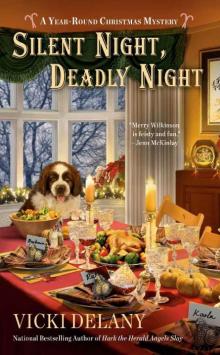 Silent Night, Deadly Night
Silent Night, Deadly Night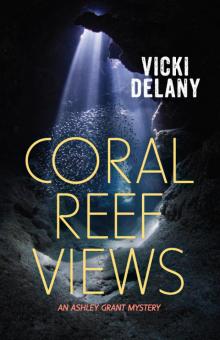 Coral Reef Views
Coral Reef Views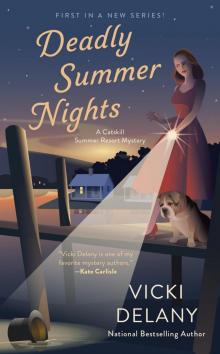 Deadly Summer Nights
Deadly Summer Nights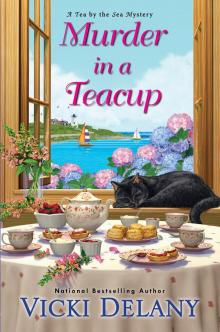 Murder in a Teacup
Murder in a Teacup Whiteout
Whiteout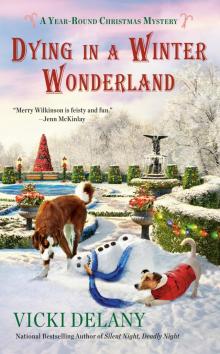 Dying in a Winter Wonderland
Dying in a Winter Wonderland Tea & Treachery
Tea & Treachery Rest Ye Murdered Gentlemen
Rest Ye Murdered Gentlemen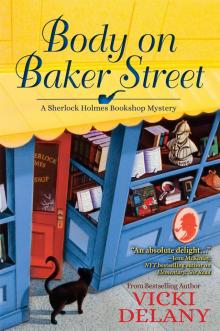 Body on Baker Street: A Sherlock Holmes Bookshop Mystery
Body on Baker Street: A Sherlock Holmes Bookshop Mystery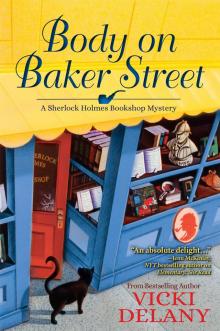 Body on Baker Street
Body on Baker Street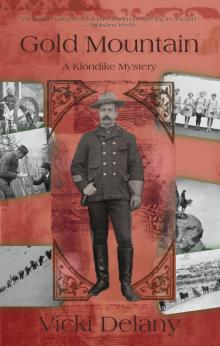 Gold Mountain
Gold Mountain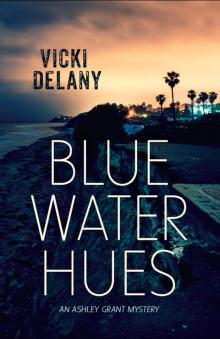 Blue Water Hues
Blue Water Hues Hark the Herald Angels Slay
Hark the Herald Angels Slay Murder at Lost Dog Lake
Murder at Lost Dog Lake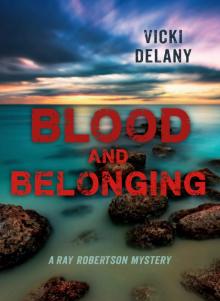 Blood and Belonging
Blood and Belonging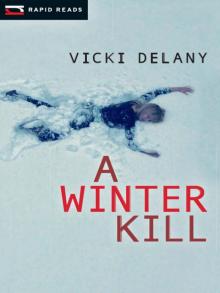 A Winter Kill
A Winter Kill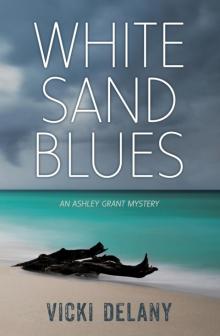 White Sand Blues
White Sand Blues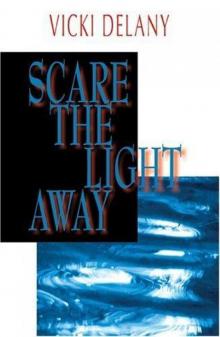 Scare the Light Away
Scare the Light Away Burden of Memory
Burden of Memory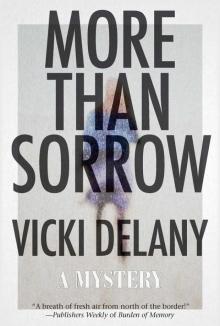 More Than Sorrow
More Than Sorrow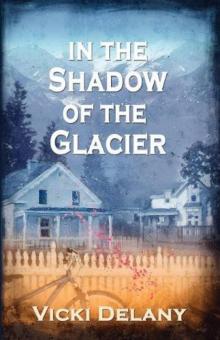 In the Shadow of the Glacier
In the Shadow of the Glacier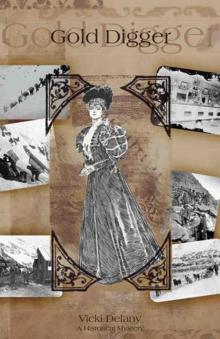 Gold Digger: A Klondike Mystery
Gold Digger: A Klondike Mystery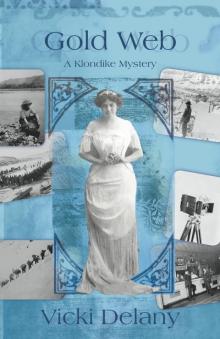 Gold Web
Gold Web Haitian Graves
Haitian Graves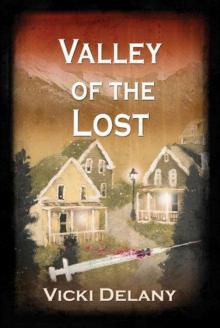 Valley of the Lost
Valley of the Lost We Wish You a Murderous Christmas
We Wish You a Murderous Christmas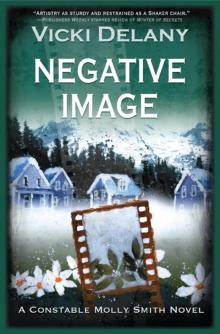 Negative Image
Negative Image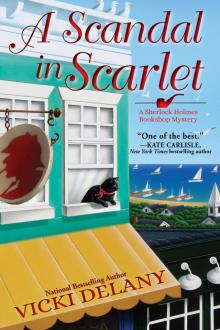 A Scandal in Scarlet
A Scandal in Scarlet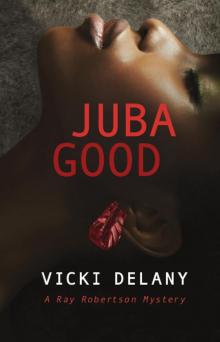 Juba Good
Juba Good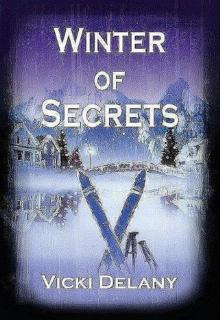 Winter of Secrets
Winter of Secrets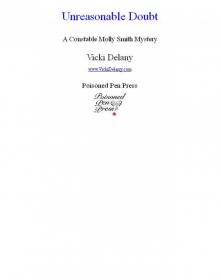 Unreasonable Doubt
Unreasonable Doubt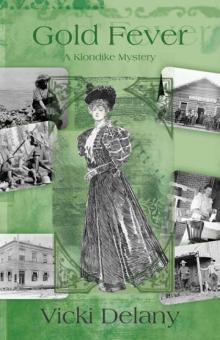 Gold Fever
Gold Fever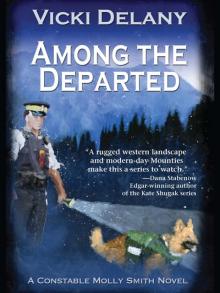 Among the Departed
Among the Departed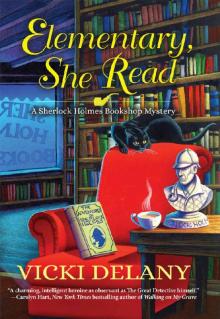 Elementary, She Read: A Sherlock Holmes Bookshop Mystery
Elementary, She Read: A Sherlock Holmes Bookshop Mystery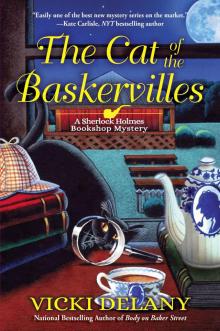 The Cat of the Baskervilles
The Cat of the Baskervilles